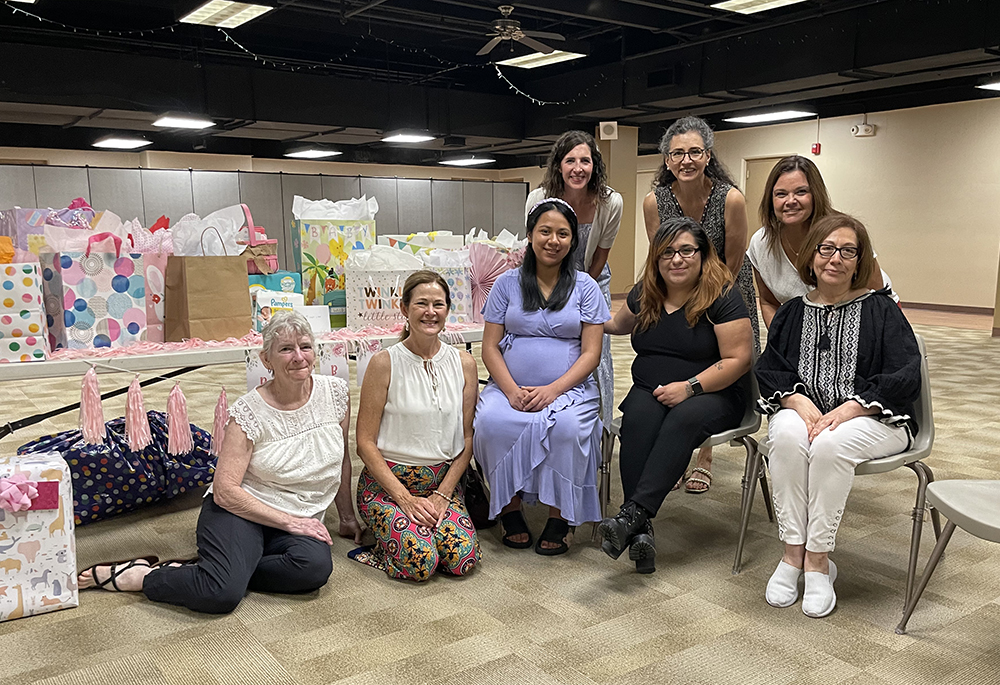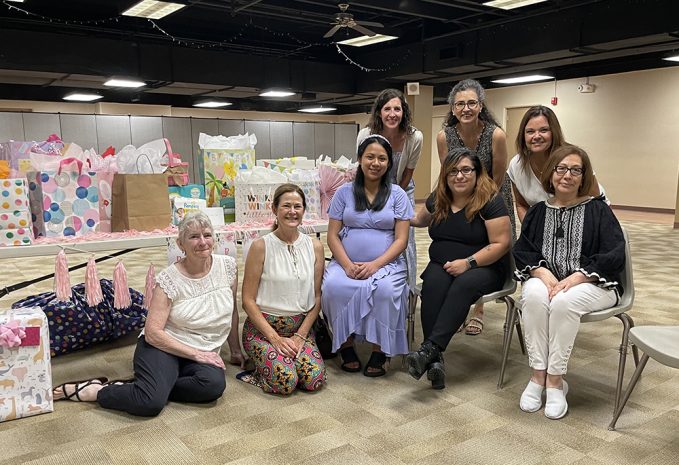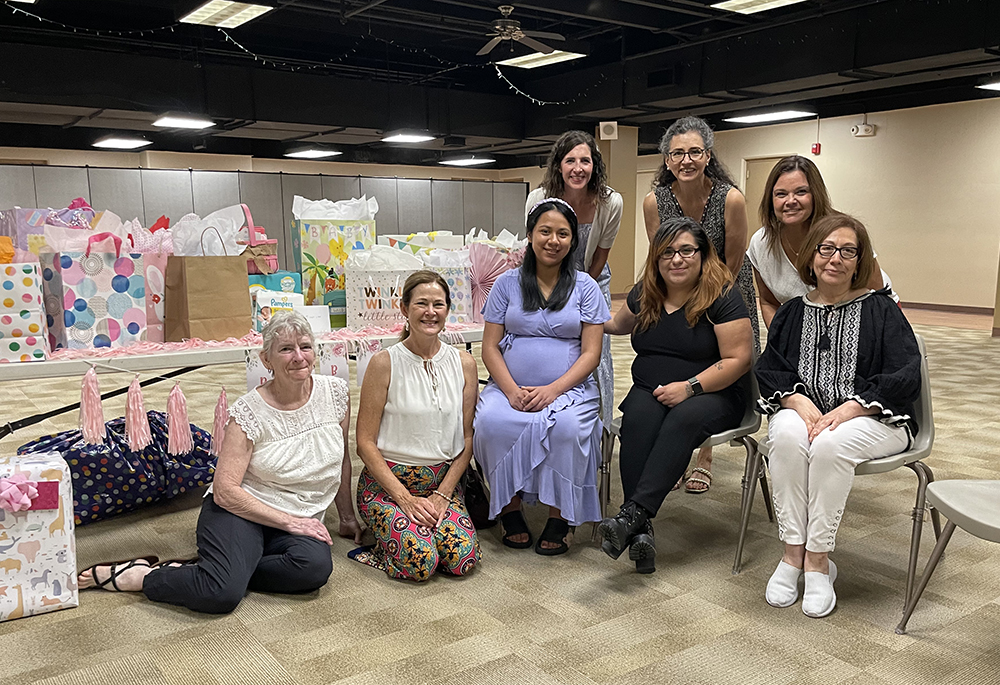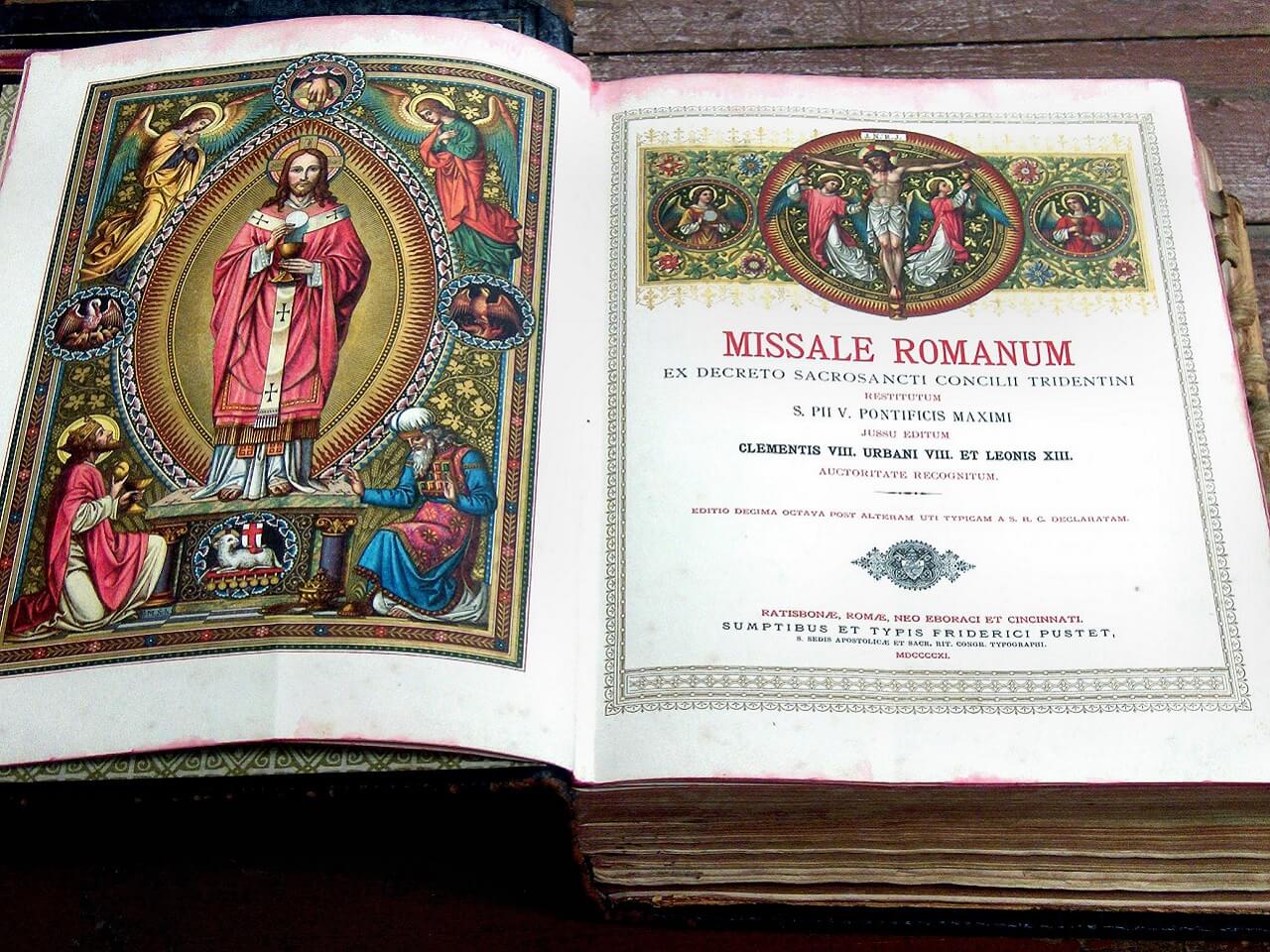Bishops’ project for moms in need aims to change church’s pro-life image
When a single mom lost everything because she had to move out of a roach-infested apartment and the landlord confiscated all her belongings, a group at a Kansas City-area parish provided pots and pans, bedding and clothing for her three children. They also partnered with other parishes to stock her refrigerator full of food. Another […]



When a single mom lost everything because she had to move out of a roach-infested apartment and the landlord confiscated all her belongings, a group at a Kansas City-area parish provided pots and pans, bedding and clothing for her three children. They also partnered with other parishes to stock her refrigerator full of food.
Another mother, recently widowed, needed assistance with yard work and occasional respite help with her adult daughter who is on the autism spectrum. Again, volunteers from Queen of the Holy Rosary Parish in Overland Park, Kansas, stepped in. The group also provides five meals to any woman in the parish boundaries who has recently given birth.
The volunteers are part of their parish’s “Walking with Moms in Need” group, a nationwide initiative of the U.S. Catholic bishops’ conference that is attempting to change the stereotype of a judgmental church that doesn’t really care about women facing difficulties with pregnancy or parenting.
“If you’re struggling, we want you to see the Catholic Church as a place to feel loved and supported and to get what you need,” said Katie O’Hara, volunteer coordinator for the program at the Queen of the Holy Rosary.
The group connects with needy moms through notices in the bulletin and on the parish website, or through word of mouth. They also work with the Kansas City, Kansas, Archdiocese’s Pro-Life Office, which coordinates resources and referrals.
O’Hara admits the parish volunteers — all women — are not professional social workers, and the number of mothers the parish has helped in the past year and a half is relatively small (seven, plus 20 through the new moms meal train). But they are part of a growing number of parishes with similar groups aimed at putting pro-life principles in action.
How the program is implemented varies from parish to parish, but most offer not only practical and financial assistance, but also emotional and spiritual support, said Kat Talalas, a contractor with the U.S. bishops’ pro-life secretariat who works with the program at the national level.
“One thing we see over and over again is that women feel so alone,” she told NCR. “It isn’t just about connecting them to a service. … It’s seeing this person as my sister and asking, ‘How can I help her, pray for her and accompany her, as well as get her the support she needs in a practical way?’ “
Yet some Catholics involved in the debate about abortion are concerned that the program is only window dressing and argue that the church as an institution could be putting its resources toward structural changes that would help all pregnant women and mothers.
“It’s really great that instead of accusing women of murder and shaming them with sin-based discourse, there is a focus on compassion, care and accompaniment within her discernment,” said Emily Reimer-Barry, associate professor of theology and religious studies at the University of San Diego.
Although she believes the message is a step in the right direction, Reimer-Barry thinks baby showers or diaper drives are insufficient. “There doesn’t seem to be an influx of resources from the parish, dioceses or USCCB central offices to provide actual support for women,” she said, noting by comparison the planned eucharistic revival’s budget of $14 million, which was originally $28 million.
Talalas declined to give specifics about Walking with Moms in Need’s budget. Although “not administered top down,” it is one of two major pastoral initiatives (along with Project Rachel) that the national office staff support directly or indirectly. Both are funded by the U.S. bishops’ conference, she said, adding, “In truth, the power of Walking with Moms in Need is the grassroots nature of this effort.”
She noted the effort is primarily lay-led and requires little to no financial commitment from the parish budget. “It can really be tailored to what the parish has available, what the needs are in the community and where those two things meet,” she said.
Growing slowly
Walking with Moms in Need was launched in 2020, but got a slow start because of the COVID-19 pandemic. It received a boost, at the national level, after the U.S. Supreme Court decision that overturned Roe v. Wade in June 2022.
At that time, the chair of the bishops’ Committee on Pro-Life Activities, Baltimore Archbishop William Lori, said the church needed to “redouble our efforts to help women in difficult pregnancies” and specifically mentioned Walking with Moms in Need.
Because the program is decentralized, the bishops’ conference was not able to provide updated statistics about the number of participating parishes or dioceses, or the number of women served. However, a survey from 2022 indicated that more than 75 U.S. dioceses or archdioceses out of 194, or about one-third, were at various stages of engagement with the program, which is voluntary for bishops and dioceses, according to Talalas.
Even dioceses with “robust” participation report that a minority of parishes have gotten involved: about one-third in the Kansas City Archdiocese and about one-fifth in the Phoenix Diocese, according to numbers provided by Talalas. A recent introductory webinar in January, however, attracted more than 1,500 registrants, representing more than 150 dioceses and archdioceses.
In the Phoenix Diocese, the program has been operating for more than three years and “little by little” has been adding parishes, according to Marina Salvador-Velázquez, manager of the diocesan Office of Respect Life Ministries.
She says the program combats the view that the church only cares about babies before they are born. “The church wants to remind women that they’re not alone,” said Salvador-Velázquez, “and we want to be there for them and provide resources for them.”
After assembling a core team, one of the first steps to starting a group involves an inventory of local resources that could provide emotional, financial and physical help to moms in need. Often this includes Catholic organizations such as Catholic Charities, St. Vincent de Paul or Knights of Peter Claver ministries, Gabriel Network maternity homes, or crisis pregnancy centers.
The program’s 78-page Parish Action Guide advises not to “reinvent the wheel,” but rather to identify pregnancy-help related resources, “such as a pregnancy help center, your local Catholic charities or Catholic social services agency, or another pro-life organization.”
This association with pregnancy help centers, also sometimes referred to as “crisis pregnancy centers,” concerns Jamie Manson, president of Catholics for Choice, which supports legalized abortion.
“Obviously, I want the church to center mothers who have children and their needs,” Manson told NCR. “That would be a wonderful and real way for the Catholic Church to put its beautiful social justice tradition into action.”
But she worries that these parish programs could create “a pipeline to crisis pregnancy centers.”
Such centers offer pregnancy tests and ultrasounds, coupled with messaging against abortion. They are largely unregulated and faith-based, and since the Dobbs decision have seen the millions they receive in government funding skyrocket. The University of Georgia College of Public Health’s crisis pregnancy center map numbers them at about 2,500 nationwide.
But reproductive rights advocates and mainstream medical groups, such as the American Medical Association and the American College of Obstetricians and Gynecologists, accuse them of misleading women.
“Crisis pregnancy centers offer free care under the guise of being a medical facility,” said Manson, noting that they often do not have medical staffing. “They do not meet the standard for Catholic social justice practice.”
Women who visit crisis pregnancy centers “are already in a vulnerable position,” Manson said. “They get manipulated; they get lied to; they don’t get the dignity of getting presented with all the options they have. That violates a woman’s dignity, freedom and God-given conscience. That to me is a real concern.”
Advertisement
Needs and priorities
In the Phoenix Diocese, Salvador-Velázquez says the “first thing” parishes should do is connect a woman with a pregnancy help center to “make sure the woman is OK and the baby is OK.”
“Parishes should know who their local pregnancy help centers are, so we don’t have to reinvent the wheel,” said Salvador-Velázquez, who volunteered at a center in Los Angeles for four years.
Talalas of the U.S. bishops’ pro-life secretariat said parishes could assist local pregnancy help centers or even start one if there is none in their area.
“There are always gaps where Walking with Moms in Need can step in,” she said. “We’re not trying to replace pregnancy care centers, we’re trying to support them.”
Salvador-Velázquez says the goal is to reach out to a woman “before she’s considering abortion” and assist with urgent needs, such as food or shelter, especially if she is in a situation of domestic violence.
Many of the women served by the Phoenix program are undocumented, and bilingual volunteers are available to accompany them, she said. Some parishes host baby showers to provide cribs, strollers and other items. Others provide transportation; one parish offered Uber gift cards to women for doctor’s appointments.
But Reimer-Barry questions whether a parish is ready for the decades-long commitment that parenting entails. “If you have a baby shower for a woman, that might provide for their needs for two months, but we’re talking about a commitment for 22 years.”
In her forthcoming book, Reproductive Justice and the Catholic Church: Advancing Pragmatic Solidarity with Pregnant Women, Reimer-Barry argues that the church should address difficult pregnancies by implementing structural reforms while also providing spiritual care to those in need.
“We need to focus on changing unjust social conditions so that pregnant women can make the best decisions within their specific circumstances,” she told NCR.
The church could better advocate to expand social programs, such as food stamps and housing assistance, or expand its educational networks to include children under 6. It also could work to address the crisis of maternal mortality, especially among women of color, she said.
“If the bishops really wanted to show concern for pregnant women, they could be on the front lines of advocating for the expansion of resources for reproductive health care,” she said. “They could oppose the closing of labor and delivery wards.”
In their 2023 letter for Respect Life Month, the U.S. bishops say that “radical solidarity” for mothers in need includes “collective efforts within our dioceses, parishes, schools and local communities, engagement in the public square, and pursuit of policies that help support both women and their preborn babies.”
But the letter also quotes a “Walking with Moms in Need” volunteer coordinator who notes that “I think for too long we have been comfortable leaving the work of accompanying women in crisis situations — pregnant or parenting — to others in the nonprofit and government sectors.” Instead, she argues that parishes assisting women, even with just a few hundred dollars, can be the solution.
Manson believes the bishops, in having made opposing legalized abortion their “preeminent” priority, have not spent the time and money necessary to build an infrastructure for the influx of need that will come with loss of access to abortion.
“There is an urgency to at least show that they’re investing in trying to be of support for women and children,” she said of the Walking with Moms in Need initiative. “I do think the bishops understand we are meant to care for the poor. The question is, ‘Where have they put most of their money?’ “














